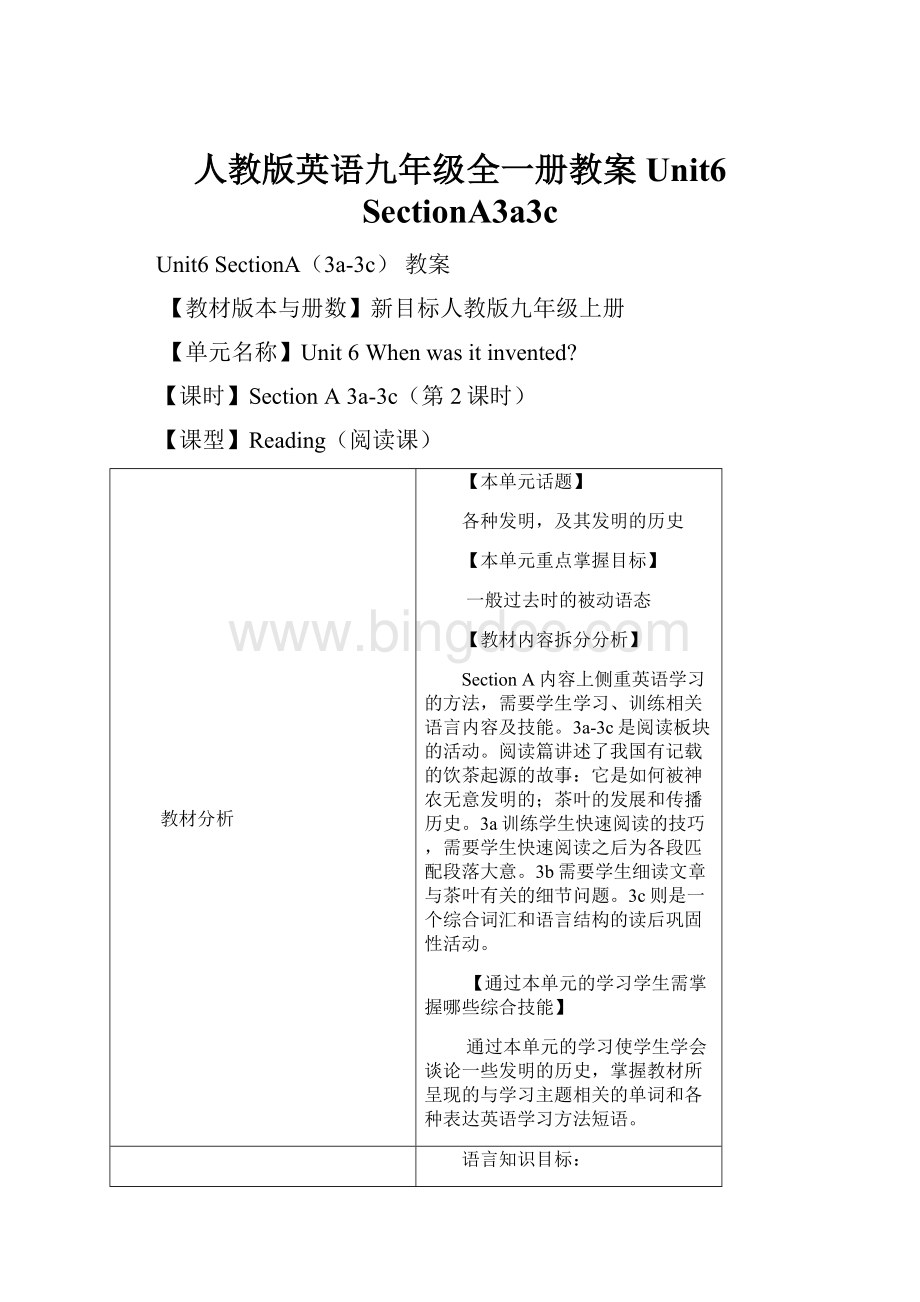人教版英语九年级全一册教案Unit6 SectionA3a3c.docx
《人教版英语九年级全一册教案Unit6 SectionA3a3c.docx》由会员分享,可在线阅读,更多相关《人教版英语九年级全一册教案Unit6 SectionA3a3c.docx(15页珍藏版)》请在冰点文库上搜索。

人教版英语九年级全一册教案Unit6SectionA3a3c
Unit6SectionA(3a-3c)教案
【教材版本与册数】新目标人教版九年级上册
【单元名称】Unit6Whenwasitinvented?
【课时】SectionA3a-3c(第2课时)
【课型】Reading(阅读课)
教材分析
【本单元话题】
各种发明,及其发明的历史
【本单元重点掌握目标】
一般过去时的被动语态
【教材内容拆分分析】
SectionA内容上侧重英语学习的方法,需要学生学习、训练相关语言内容及技能。
3a-3c是阅读板块的活动。
阅读篇讲述了我国有记载的饮茶起源的故事:
它是如何被神农无意发明的;茶叶的发展和传播历史。
3a训练学生快速阅读的技巧,需要学生快速阅读之后为各段匹配段落大意。
3b需要学生细读文章与茶叶有关的细节问题。
3c则是一个综合词汇和语言结构的读后巩固性活动。
【通过本单元的学习学生需掌握哪些综合技能】
通过本单元的学习使学生学会谈论一些发明的历史,掌握教材所呈现的与学习主题相关的单词和各种表达英语学习方法短语。
教学目标
语言知识目标:
1.通过教师自身的情景式导入和与学生互动的问答形式,学习和巩固该话题下的词汇句型,激发调动学生的求知欲,熟练使用以下词汇、短语和句型:
单词:
nearly,ruler,boil,remain,smell,saint,national,trade,doubt
熟练掌握短语:
takeplace,withoutdoubt,fallinto,byaccident,anopenfire
句型:
Itissaid/believedthat…
Themostpopulardrinkintheworldwasinvented.
TeawasbroughttoKoreaandJapanduringthe6thand7thcenturies.
2.阅读技巧:
通过快速阅读能够大致获取文章信息,通过精细阅读能抓取文章细节。
情感态度价值观目标:
热爱中国文化
教学重难点
教学重点:
1.掌握本课时重点单词,短语和句型。
2.学会一般过去式的被动语态
3.能够简述茶的起源
教学难点:
1.一般过去式的被动语态
2.用自己的话复数文章,简述茶的起源
建议教法
1.提问对话法
2.整体感悟法
3.理清思路法
4.语言分析法
教学流程
(详见相应教学活动设计)
教学评价
1.本课时的目标设计清晰可操作,活动的设计紧扣目标要求并与目标达成一致。
2.阅读的活动设计遵循语言规律,由易到难逐层递进,充分体现语言输入到语言输出的完整过程。
3.读后的活动设计体现对文本内容的深度挖掘和文本再构,体现了对学生思维品格的训练与培养。
步骤
过程
措施(教师活动与学生活动)
目的
持续性评价
DELC4
1
预备与激活先期知识
Step1
GreetingandLeadingin(3mins)
1.Greettheclass.Lookatthescreen,showapictureoftea.
T:
Doyoulikedrinkingtea?
Ss:
Yes/No.
T:
Doyouknowwhenandhowitwasinvented?
Todaywe’lllearnapassageabouttea.
通过茶的图片导入新课,使学生明了本堂课内容,激发学生兴趣。
通过老师给出的信息,学生能否整体感知文章要讲的内容。
附:
教学活动设计
DELC5
2
获取新知识
Step2
Pre-
reading
(阅读前前(5mins)
Step3
While-
Reading
(阅读中)
(12mins)
T:
Let’swatchavideoabouttea.Doyouknowthem?
(apictureofShenNongandapictureofLuYu)引出单词“ruler”
Ss:
…
T:
WhatwasShenNongdoing?
”
Ss:
Hewasboilingdrinkingwater.引出单词“boil”
T:
Hewasboilingwater,andsomeleavesfellinto(引出fallinto)thewaterandremainedthereforsometime.(引出单词remain)Itproducedanicesmell.Itwasdelicious.Thatwashowteainvented.Itwasinventedbyaccident.引出“byaccident”
T:
LuYuisthesaintoftea.
1:
Scanthepassagebythemselves,andmatch
eachparagraphwithitsidea.(3a)
Paragraph1Howteawasinventedbyaccident
Paragraph2LuYuandhisbookChaJing
Paragraph3Howteaspreadtoothercountries
2:
Readthepassagecarefullyandanswerthequestions.,then
checkanswers.(3b)
1.Whenwasteafirstdrunk?
About5,000yearsago.
2.Howwasteainvented?
Byaccident.
3.Whoiscalled“thesaintoftea”?
LuYu.
4.WhatisChaJingabout?
Itisabouthowteaplantsweregrownandusedtomaketeaandwherethefinesttealeaveswereproducedandwhatkindsofwaterwereused.
5.Whenwasteabroughttoothercountries?
ItwasbroughttoKoreaandJapanduringthe6thand7thcenturies,toEnglandaround1660.
用神农和陆羽的图片做简介,同时
把文章中一些重要的单词短语引出,
降低学生阅读难度;,最后通过一
段录像了解茶叶,增加学生学习兴趣。
通过泛读,了解文章大意,选出每段段落大意
通过第二遍细读,了解文章细节,回答问题。
1.学生是否能熟悉新单词和句型
2.学生对中国茶文化和历史是否有一定了解
学生是否能通过泛读,精读文章获取文章信息。
DELC6
3
深度加工知识
Step4
Post-
reading(读后)(15mins)
T:
Sinceyouhavelearnedsth.abouttea.Let’sdosomeexercise.
Readandfilltheblanks.
Filltheblanksaccordingtothefirstparagraph.
Tea(afterwater),themostpopulardrinkintheworld_______(invent)byaccident.Itisbelievedthattea_______(drink)5,000yearsago.It______(say)thataChineseruler______(call)ShenNongwasthefirst______(discover)teaasadrink.OnedayShenNong_______(boil)drinkingwateroveranopenfire.Someleavesfromateaplant____(fall)intothewaterandremainedthereforsometime.It________(produce)anicesmellsohe______(taste)thebrownwater.Itwasqui
tedelicious,andso,oneoftheworld’sfavoritedrinks_________(invent).
Filltheblanksaccordingtothesecondparagraph.
LuYu,“thesaintoftea”,______(mention)ShenNonginhisbookChaJingafewthousandyearslater.Thebookdescribeshowteaplants_______andusedtomaketea.Italsodiscusseswherethefinesttealeaves_______(produce)andwhatkindsofwater_______(use).
Fillintheblanksaccordingtothethirdparagraph.
Peoplebelievedthattea_______(bring)toKoreaandJapanduringthe6thand7thcenturies.InEngland,tea________(notappear)untilaround1660,butinlessthan100years,ithadbecomethenationaldrink.TheteatradefromChinatoWesterncountries______(take)placeinthe19thcentury.
3cCompletethesentenceswiththecorrectformsoftheverbsinthebox.
1.告诉学生们本学习活动的要求:
用所给单词的适当形式填空。
2.让学生们读3c中的内容,理解每句子的大体意思。
3.学生们阅读句子内容,回想短文的内容,选择恰当的单词并用其恰当形式填空。
4.如果不能直接填上,可以再去阅读短文,在相关的内容处,再仔细进行阅读,找到相关信息,并完成句子。
5.Checktheanswers
Languagepoints
byaccident.
byaccident=bychance意为“偶然地;意外”,作副词用。
如:
Imetthesingerbyaccidentyesterday.
拓展:
byaccident与bymistake的区别:
bymistake表示不小心地,错误地。
如:
Itookyourumbrellabymistakeyesterday.
byaccident表示“偶然地”。
如:
Imetmyoldneighbourintheparkbyaccident/chanceyesterday.
那个小孩在登山中意外地摔伤了腿。
Thatchildbrokehisleg_byaccident__________whenhewasclimbingthemountain.
TheteatradefromChinatoWesterncountriestook
placeinthe19thcentury.
takeplace表示“发生、举行、举办”,一般指非偶
然性事件的“发生”,即这种事件的发生一定有某种原因或事先的安排.
如:
Greatchangeshavetakenplaceinourhometowninthepasttenyears.
takeplace与happen的区别:
①takeplace为稍正式用语。
一般指非偶然性事件的“发生”,即这种事件的发生一定有某种原因或事先的安排。
除“发生”外,常翻译为“进行、举行、开展”,主语是物,无被动语态。
如:
Asportsmeetingtakesplaceinourschooleveryterm.
②happen作“发生、碰巧”解,一般用于偶然或突发性事件。
物做主语,无被动语态。
表示某人发生某事要用sth.happentosb.而sb.happentodosth.是某人碰巧做某事
如:
Anaccidenthappenedtoher.她发生了一场事故。
Ihappenedtoseehimonmywayhome.
我在回家路上碰巧遇到他。
1.读后通过各种练习加深对文章的理解,细分到每一段,对文章的一种再现。
2.训练学生归纳总结,小组合作的能力,对重点词汇,短语,句型进行操练。
。
1.学生是否能用已了解的文章信息做好相应的词形变化。
2.学生是否能掌握核心句型。
DELC7
4
评价学生学习
Step5
Summary
(5mins)
Step6
Exercise
1.LetSsreadthewholepassagetogether.
2.LetSsusefiveorsixsentencestoretellthepassage
3.Useamind-maptosummarize
Exercise.
单选
1.Ifoundmylostbookundermybed____.
A.byaccident B.bytheendC.bymistakeD.bycar
2.Thestudentsdidn'tstoptalking__theteachercameintotheclassroom.
A.while B.until C.as D.at
3.Onlyafewtigers__inChina.
A.haveB.remainC.keepD.stay
4.Greatchanges___inthecityinthelastfewyears.
A.havebeentakeplaceB.happened
C.havetakenplaceD.havehappened
5.Itis___thatourEnglishteacherwillvisitEnglandduringthesummervacation.
A.saidB.sayingC.sayD.says
Homework
1).Retellthepassage.
2).Makesentenceswiththesephrases“byaccident,takeplace,nodoubt,beusedfor,fallinto”.
1.通过朗读,再复习文章
2.通过复述文章,训练学生归纳,获取信息能力培养学生学会总结归纳并形成判断的思维品质,培养学生们小组合作意识,学会向别人求助,取长补短,养成一种良好的学习习惯。
通过对文章的反复再现,让大多数学生能够清晰掌握本课时语言重点,能否学以致用,举一反三.形成学生持续性评价